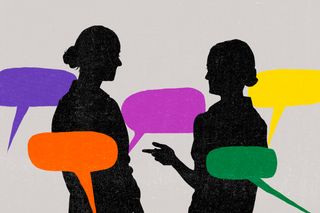
Appropriate Language Can Reduce Mental Health Stigma, Improve Access to Treatment: Experts
Researchers identified 250 common words and labels such as “disturbed” or “confused” that discourage people to seek professional help.

Using scientifically accurate and non-stigmatizing language for describing mental health conditions and substance use can reduce the stigma associated with the condition — and encourage people to access treatment, according to experts.
Stigma and bias remain prevalent factors that dissuade people from seeking professional help. Here, researchers defined stigma as “negative attitudes toward people based on distinguishing characteristics.” Over the years, mental health experts have noted the critical role language plays — as a means by which stigma is expressed — in posing a barrier to seek treatment.
Using scientifically accurate terms, and language that centers on the experiences of people, both play an important role in reducing the stigma associated with the conditions. Researchers identified 250 common words and labels that are often used to stigmatize conditions. Usage of terms like “disturbed” or “confused,” or those which attribute violence and loneliness to mental health conditions, discourage people from seeking professional help.
“The words we use to describe mental illnesses and substance use disorders (addiction to alcohol and other legal and illegal drugs) can impact the likelihood that people will seek help and the quality of the help they receive,” the paper, published in Neuropsychopharmacology stated.
The analysis raises important issues about how practitioners deal with mental health conditions — and how considerate usage of words can change people’s attitudes about treatment. Using certain language to describe or talk about mental health conditions issues can alienate people if it sensationalizes the condition, labels a person by their condition mental illness, or trivializes it, according to Everymind.
It is important to trace how stigma exists in general interactions. Researchers have previously identified scientifically inaccurate, frequently misused, and ambiguous terms in psychiatry that fuel stigma-induced bias.
Related on The Swaddle:
For Women, Children With Preexisting Mental Illness, Treatment Is Out of Reach During Covid19
Notably, any form of stigma can affect self-perception and also influence societal attitudes towards people, which in turn affects their access to care. “When a person with a mental illness or substance use disorder continues to experience stigma, they may begin to internalize it. This ‘self-stigma’ can lead to lower self-esteem and feelings of self-worth and can become an ongoing source of distress that may exacerbate symptoms and create barriers to successful treatment,” the study noted.
This is because of a process in the brain called “association activation,” which is how the brain makes connections between words and ideas. Experts say this phenomenon explains the link between bias in language and people’s behavior towards treatment.
A study on the difference between the use of the terms “substance use disorder” and “substance abuser,” for instance, found that the latter can perpetuate stigmatizing attitudes because it implied that the person was “personally culpable and that punitive measures should be taken.”
Experts thus point to the importance of changing language. In the cases of substance use disorders, it is important to strip people of the notion that people are “morally at fault.” Moreover, words such as “junkie” tend to view people through the lens of their personal failings and hence, increase stigma and prevent lifesaving treatment for such individuals.
Researchers have also suggested that avoiding “totalizing” terms such as “schizophrenic” can help address the stigma around the condition.
Moreover, researchers suggest centering the language on the person, instead of their conditions. Currently, practitioners endorse “people-first language” (PFL) to describe mental health conditions and substance use disorders — it reinforces the person’s dignity and doesn’t define them by their illness. PFL is “a form of linguistic expression relying on words that reflect awareness, a sense of dignity, and positive attitudes about people with disabilities,” said one study published in the Journal of the American Psychiatric Nurses Association.
PFL thus overcomes these negative associations by putting the person first; it describes “what a person has, not what a person is.” Such language has also been associated with promoting better recovery.
The authors of the present paper conclude that a shift in language is essential towards facilitating access to mental health resources and services. Notably, language remains a powerful tool in promoting more dignity, empathy, and respect in psychiatry. Eroding prejudice built into language can help people living with mental health conditions seek better care.
“Stigma is difficult to eliminate,” the experts note, but maintain that “changing the language we use to describe these conditions can make a significant and immediate difference for the people experiencing them.”
Rohitha Naraharisetty is a Senior Associate Editor at The Swaddle. She writes about the intersection of gender, caste, social movements, and pop culture. She can be found on Instagram at @rohitha_97 or on Twitter at @romimacaronii.
Related


Urinary Incontinence in Women Linked to Poorer Mental Health, New Study Shows
